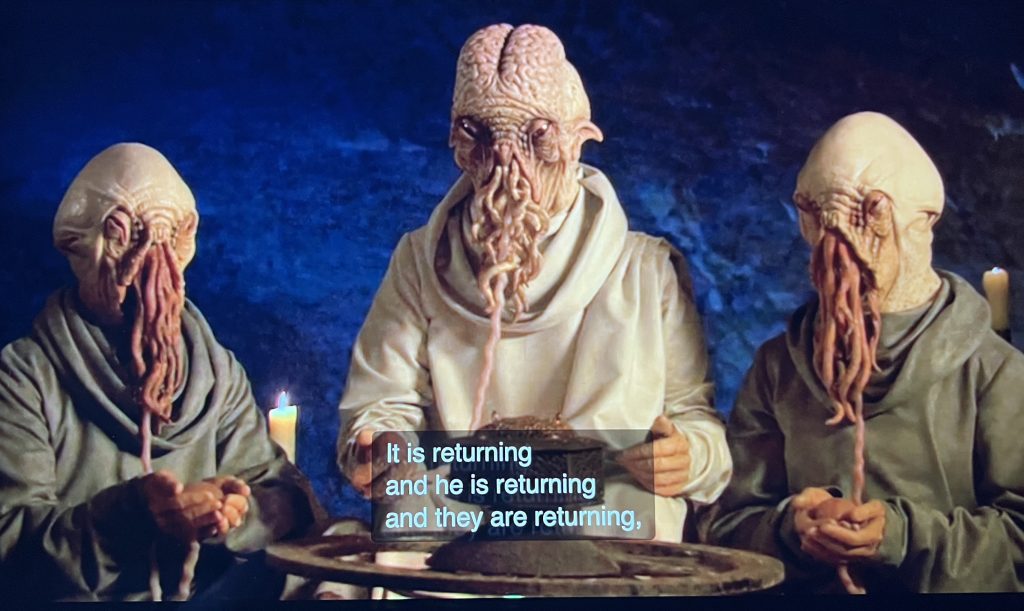
I will be the first to admit that this post is long overdue. Russell T Davies was announced as the new Doctor Who showrunner months ago, but, since receiving my Masters in Film and Television Studies last May, my brain has been on a bit of a vacation. (I can tell you, however, that crocheting elephants should not be as difficult as the patterns make it.)
I also want to take a quick second to acknowledge and speak about my mental health (because I started writing this blog post in October and am only now finishing it). I love writing, but depression, anxiety, and ADHD sometimes make it difficult to engage in some of the activities I enjoy (we’ve all seen those commercials, right?). The COVID-19 pandemic has had a major impact on everyone’s mental and physical health. Now is the time to be both open about our own issues and supportive of others. You are not alone and neither am I.
A quick summary of the last two years: I had the privilege of studying film, television, and fandom with some amazing professors. It was amazing. I also got married, which was nice too. My Master’s Thesis was on Doctor Who, the very show that first got me interested in television studies way back in 2008 (almost a full decade before I knew what television studies is). One of the chapters in my thesis actually examines the revival’s showrunners, Davies, Steven Moffat, and Chris Chibnall. On September 24 it was announced that when Chris Chibnall steps down as showrunner, RTD will be returning and I have many thoughts on this. (This is my first blog post in 2 years and I have ADHD, so please bear with me.)
First, one thing I recognize is the impact of the COVID-19 pandemic, which is still very much part of our lives. (I feel confident generalizing since this has literally impacted the entire world.) Specifically, it has had a large impact on media production. In the case of Doctor Who, the most recent season was delayed and also shortened from 10 episodes to 8, and now 6. Following the pattern, 13th Doctor Jodie Whittaker will be leaving after 3 seasons (and 2 specials airing this year in addition to the most recent New Years Day special). This means that Davies and his new Doctor will be making their return/debut in 2023, just in time for the 60th anniversary of Doctor Who.
In the 50th Anniversary Special of Doctor Who, Steven Moffat reversed what Davies did from his first episode: he saved the time lords. He also had a huge budget and a global simulcast. When Davies was showrunner, the budget was significantly smaller and no one expected Who to become the global property it is now. While Davies was acknowledged as a fan of the series, this was not a central feature of the marketing, however, it is difficult to ignore as he makes his return. One specific quote regarding his return notes that there is content for him to enjoy as a viewer before he makes his return. Davies has always demonstrated appreciation and respect for the work of previous Doctor Who creatives. When he originally revived the series, he deliberately built on what was already there rather than trying to retcon and I think this is another opportunity for him to do that. I believe that it is because he is a fan that he is making his return.
There is also so much more money to work with. The 50th Anniversary, which occurred 3 years after Davies’s departure, was given blockbuster treatment both in terms of marketing and production values. Since then, the quality has only continued to improve. I would think that it was frustrating to miss out on working on such an exciting anniversary, which is why he will be back just in time for the 60th. There’s also so many more resources to play with. Although Doctor Who was historically a show that works with a limited budget– and Davies can obviously work within those constraints (did you know he invented the psychic paper?!) – a larger budget obviously increases the narrative possibilities.
The show is also no longer just a British staple, but has worldwide relevance now and these anniversaries receive far more attention and build up than they did when Davies first revived the series in 2005 (when there were supposedly only 8000 dedicated Doctor Who fans). Davies is responsible not only for the successful revival, but for one of the best eras of the series (Tenth Doctor David Tennant is still voted favorite Doctor over a decade after his departure). He is also the only showrunner to create a Doctor Who spin-off that lasts more than one season (The Sarah Jane Adventures and Torchwood). To the BBC, Davies has already proven to be a profitable entity. Therefore it makes sense that he would jump at the chance to return and that the BBC would be eager to have him.
Tl;dr: Davies loves Doctor Who and is good at making Doctor Who content, so it makes sense that Davies and the BBC would both welcome this return.
In the weeks following the Davies announcement, I had a lot of thoughts as to what this era would look like, along with many questions. For example, I was certain that David Tennant would not be the Fourteenth Doctor, but that is now rumored to be the case. (Apparently, there is precedence as the Second Doctor, Patrick Troughton almost returned as the Seventh Doctor.) I’ve also learned recently that this year is the BBC’s 100th birthday, which has added an additional element of pomp and circumstance. So I have to wonder how long Davies will be at the helm this time. Will he only be around for the 60th anniversary or will he have another multi-season tenure? The announcement suggests that the latter will be the case, but for some reason, I cannot help having doubts, especially now that David Tennant is rumored to return as the official Fourteenth Doctor.
Regardless of whether or not he is the Fourteenth Doctor, I do believe that Tennant will be part of the 60th Anniversary Special. Actually, I think Davies is going to get as many Doctors as he can. During the 50th Anniversary, Davies had a brief cameo in the short film, “The Five(ish) Doctors,” which was made by Fifth Doctor Peter Davison and depicts his attempts to be part of the 50th Anniversary Special, along with Sixth Doctor Colin Baker and Seventh Doctor Sylvester McCoy. So, I have to wonder if the joke will be on everyone else when they do appear in the next anniversary special. Although, these Doctors could be recast, as was the case with First Doctor William Hartnell.
As part of the 50th Anniversary, the BBC produced a biopic depicting Doctor Who’s creation and starring David Bradley as Hartnell. Later, Bradley went on to play the First Doctor in the Christmas Special “Twice Upon a Time.” So there is precedence– although the First Doctor was also recast in the 20th Anniversary Special, following Hartnell’s death. I don’t think it would be surprising if the only recast Doctors were those whose actors have died. With The Sarah Jane Adventures, Davies demonstrated his fondness for the Classic Era, so I can totally see him indulging once again in bringing back all available Doctors (as was also the case during the Classic Era Anniversaries).
I don’t know if this is something we can expect, but I, personally, am hoping for the return of Mark Gatiss both as a writer and as an actor. His most recent Doctor Who performance was in “Twice Upon a Time” as the implied ancestor of Brigadier Sir Alistair Gordon Lethbridge-Stewart, a recurring Classic Era character, who also appeared in The Sarah Jane Adventures and has been referenced multiple times in the Revived Series. Gatiss is also known to be a huge Doctor Who fan, and has written Doctor Who novels. The episodes he’s written (although they are really hit or miss) include “The Idiot’s Lantern,” “The Crimson Horror,” “Sleep No More,” and “Empress of Mars.” I’m not going to lie, I deeply enjoy Gatiss’s chaotic energy and wondered if he would be the one to take over for Chris Chibnall (although it seems unlikely as he seems to flit around a lot; he also played Mycroft in Sherlock and served as a writer and producer).
I’d also like to see the return of Toby Whithouse (“School Reunion” and “Under the Lake” / “Before the Flood” are two of his) and the more recent addition, Maxine Alderton (“The Haunting of Villa Diodati” and “Village of the Angels”). If I’m going to speculate on writers, I have to wonder if Steven Moffat will contribute. In addition to being showrunner he wrote “The Girl in the Fireplace,” “Blink,” and “Silence in the Library” / “Forest of the Dead” under Davies, which are still considered some of the best. Chibnall also wrote for both Davies and Moffat before becoming showrunner, although I suspect he will likely take a break from Doctor Who for a while (“42” and Torchwood with Davies and “Dinosaurs on a Spaceship” under Moffat).
I am far from the only person speculating on what Davies’s return will bring. From what I’ve read, the BBC will be handing control of Doctor Who over to Bad Wolf, a production company founded by Julie Gardner and Jane Tranter who served as producers in 2005. If that’s the case, I wonder how the budget will be affected. How will Davies’s next era compare to his first, before the pop culture explosion that Moffat played up during his era? Or, to the more subdued, but visually stunning Chibnall era? It’s clear that the showrunner has a huge impact on how Doctor Who is perceived worldwide, and it seems many are looking forward to the next Davies Era.
